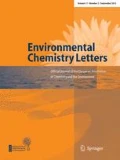Abstract
The increasing application of reclaimed water in urban areas is a rising health concern. For instance, the inhalation of reclaimed water induces polymorphonuclear cell-dominant inflammation in the lung, and prefibrosis can develop after subchronic exposure. The major toxic source, free endotoxins, could be inhibited by chlorination, yet whether the chlorination can increase or reduce the inhalation toxicity of reclaimed water is still unclear. Here, we treated secondary effluent samples with different doses of chlorine, and then mice were exposed to these samples via inhalation. We studied inflammatory markers such as polymorphonuclear cell, proinflammatory cytokines in lung lavage, induced bronchus-associated lymphoid tissue, and immunohistochemical analysis of fibrotic markers. Results show that endotoxin activities increased slightly from 951 endotoxin units per milliliter to the highest activity of 1133 endotoxin units per milliliter after disinfection. However, pulmonary inflammation was reduced after 5 and 10 mg/L chlorine treatment. The aggregate size of endotoxin displayed a decline after chlorination. Furthermore, the potential cytotoxicity of the disinfection byproducts after chlorination was not observed in the lungs after subchronic exposure. This study demonstrates that sufficient chlorination can prevent acute and subchronic pulmonary damage caused by the reclaimed water. In addition, endotoxin activity should not be used as an index for acute and subchronic toxicity control.




Similar content being viewed by others
References
Alexandrou L, Meehan BJ, Jones OAH (2018) Regulated and emerging disinfection by-products in recycled waters. Sci Total Environ 637–638:1607–1616. https://doi.org/10.1016/j.scitotenv.2018.04.391
Andra J, Gutsmann T, Garidel P, Brandenburg K (2006) Mechanisms of endotoxin neutralization by synthetic cationic compounds. J Endotoxin Res 12:261–277. https://doi.org/10.1179/096805106X118852
Angelakis AN, Asano T, Bahri A, Jimenez BE, Tchobanoglous G (2018) Water reuse: from ancient to modern times and the future. Front Environ Sci. https://doi.org/10.3389/fenvs.2018.00026
Bartis EAJ, Barrett C, Chung TY, Ning N, Chu JW, Graves DB, Seog J, Oehrlein GS (2014) Deactivation of lipopolysaccharide by Ar and H2 inductively coupled low-pressure plasma. J Phys D Appl Phys 47:45202–45212. https://doi.org/10.1088/0022-3727/47/4/045202
Ghernaout D (2020) Disinfection by-products: presence and elimination in drinking water. Oalib 07:1–27. https://doi.org/10.4236/oalib.1106140
Godiya CB, Park BJ (2022) Removal of bisphenol A from wastewater by physical, chemical and biological remediation techniques. A review. Environ Chem Lett. https://doi.org/10.1007/s10311-021-01378-6
Gude VG (2017) Desalination and water reuse to address global water scarcity. Rev Environ Sci Bio 16:591–609. https://doi.org/10.1007/s11157-017-9449-7
Liu G, Lu Y, Shi L, Ren Y, Kong J, Zhang M, Chen M, Liu W (2020) TLR4-MyD88 signaling pathway is responsible for acute lung inflammation induced by reclaimed water. J Hazard Mater 396:122586. https://doi.org/10.1016/j.jhazmat.2020.122586
Liu G, Lu Y, Shi L, Kong J, Hu H, Liu W (2021) Trace endotoxin in reclaimed water is only one of the risk sources in subchronic inhalation exposure. Environ Pollut 285:117479. https://doi.org/10.1016/j.envpol.2021.117479
Mueller M, Lindner B, Kusumoto S, Fukase K, Schromm AB, Seydel U (2004) Aggregates are the biologically active units of endotoxin. J Biol Chem 279:26307–26313. https://doi.org/10.1074/jbc.M401231200
Mueller M, Lindner B, Dedrick R, Schromm AB, Seydel U (2005) Endotoxin: physical requirements for cell activation. J Endotoxin Res 11:299–303. https://doi.org/10.1179/096805105x46574
Pepper IL, Gerba CP (2018) Risk of infection from Legionella associated with spray irrigation of reclaimed water. Water Res 139:101–107. https://doi.org/10.1016/j.watres.2018.04.001
Ren Y, Kong J, Xue J, Shi X, Li H, Qiao J, Lu Y (2019) Effects of ozonation on the activity of endotoxin and its inhalation toxicity in reclaimed water. Water Res 154:153–161. https://doi.org/10.1016/j.watres.2019.01.051
Richardson SD, Plewa MJ (2020) To regulate or not to regulate? What to do with more toxic disinfection by-products? J Environ Chem Eng 8:103939. https://doi.org/10.1016/j.jece.2020.103939
Shimizu T, Miyake T, Kitamura N, Tani M, Endo Y (2017) Endotoxin adsorption: direct hemoperfusion with the polymyxin B-immobilized fiber column (PMX). Transfus Apher Sci 56:682–688. https://doi.org/10.1016/j.transci.2017.08.015
Srivastav AL, Patel N, Chaudhary VK (2020) Disinfection by-products in drinking water: occurrence, toxicity and abatement. Environ Pollut 267:115474. https://doi.org/10.1016/j.envpol.2020.115474
Van Hoecke L, Job ER, Saelens X, Roose K (2017) Bronchoalveolar lavage of murine lungs to analyze inflammatory cell infiltration. J vis Exp. https://doi.org/10.3791/55398
Villanueva CM, Cordier S, Font-Ribera L, Salas LA, Levallois P (2015) Overview of disinfection by-products and associated health effects. Curr Environ Health Rep 2:107–115. https://doi.org/10.1007/s40572-014-0032-x
Wagner ED, Plewa MJ (2017) CHO cell cytotoxicity and genotoxicity analyses of disinfection by-products: an updated review. J Environ Sci 58:64–76. https://doi.org/10.1016/j.jes.2017.04.021
Xue J, Zhang J, Xu B, Xie J, Wu W, Lu Y (2016) Endotoxins: the critical risk factor in reclaimed water via inhalation exposure. Environ Sci Technol 50:11957–11964. https://doi.org/10.1021/acs.est.6b02395
Xue J, Zhang J, Wu QY, Lu Y (2018) Sub-chronic inhalation of reclaimed water-induced fibrotic lesion in a mouse model. Water Res 139:240–251. https://doi.org/10.1016/j.watres.2018.04.008
Xue J, Zhang J, Qiao J, Lu Y (2019) Effects of chlorination and combined UV/Cl2 treatment on endotoxin activity and inhalation toxicity of lipopolysaccharide, gram-negative bacteria and reclaimed water. Water Res 155:124–130. https://doi.org/10.1016/j.watres.2019.02.021
Zhang J, Xue J, Xu B, Xie J, Qiao J, Lu Y (2016) Inhibition of lipopolysaccharide induced acute inflammation in lung by chlorination. J Hazard Mater 303:131–136. https://doi.org/10.1016/j.jhazmat.2015.10.024
Funding
This study was funded by the National Natural Science Foundation of China (no. 51738005 and no. 21777084).
Author information
Authors and Affiliations
Corresponding author
Ethics declarations
Conflict of interest
The authors have no relevant financial or non-financial interests to disclose.
Additional information
Publisher's Note
Springer Nature remains neutral with regard to jurisdictional claims in published maps and institutional affiliations.
Supplementary Information
Below is the link to the electronic supplementary material.
Rights and permissions
About this article
Cite this article
Liu, G., Lu, Y., Shi, L. et al. Chlorine disinfection reduces the exposure risks of inhaled reclaimed water. Environ Chem Lett 20, 3397–3403 (2022). https://doi.org/10.1007/s10311-022-01476-z
Received:
Accepted:
Published:
Issue Date:
DOI: https://doi.org/10.1007/s10311-022-01476-z




